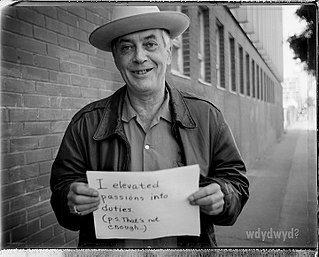Ein Zitat von Hans-Georg Gadamer
Lange bevor wir uns selbst durch den Prozess der Selbstprüfung verstehen, verstehen wir uns selbstverständlich in der Familie, der Gesellschaft und dem Staat, in dem wir leben.
Verwandte Zitate
... bis wir das Muster, in dem wir uns befinden, die Definition, die wir für uns selbst machen, verstehen, ist es zu spät, aus der Schublade auszubrechen. Wir können nur im Sinne dieser Definition leben, wie der Gefangene im Käfig, in dem er weder liegen noch stehen noch sitzen kann und der vor Gericht aufgehängt wird, damit er von der Bevölkerung gesehen werden kann. Doch die Definition, die wir von uns selbst gemacht haben, sind wir selbst. Um daraus auszubrechen, müssen wir ein neues Selbst erschaffen. Aber wie kann das Selbst ein neues Selbst erschaffen, wenn das Selbst, das es ist, die einzige Substanz ist, aus der das neue Selbst erschaffen werden kann?
Die Grundlage aller Liebe ist Selbstliebe und wir leiden in unserer Gesellschaft sicherlich sehr unter mangelnder Selbstliebe. Wenn wir nicht auf uns selbst aufpassen, ist das eigentlich nur ein Symptom dafür, dass wir uns selbst nicht lieben. Das Schlimmste, was wir tun können, ist, uns selbst dafür zu verurteilen, wie wir uns bereits behandelt haben.
Wie können wir uns selbst erkennen? . . . Die Seele braucht eine innige Verbindung, nicht nur um sich zu individualisieren, sondern einfach um zu leben. Dafür brauchen wir Beziehungen der tiefsten Art, durch die wir uns selbst verwirklichen können, in denen Selbstoffenbarung möglich ist, in denen Interesse und Liebe für die Seele im Vordergrund stehen.
Erfolg bedeutet nur, etwas aufrichtig und mit ganzem Herzen zu tun. Ich denke, das Leben ist ein Prozess. Im Laufe der Jahrhunderte ist das Ende der Helden das gleiche wie das der gewöhnlichen Menschen. Sie alle starben und verschwanden allmählich im Gedächtnis der Menschen. Aber wenn wir noch leben, müssen wir uns selbst verstehen, uns selbst entdecken und uns ausdrücken. Auf diese Weise können wir Fortschritte machen, aber wir werden möglicherweise keinen Erfolg haben.
In diesem Zustand des totalen Konsumismus – also einem Zustand der hilflosen Abhängigkeit von Dingen und Dienstleistungen sowie Ideen und Motiven, die wir nicht mehr selbst bereitstellen können – ist jeder sinnvolle Kontakt zwischen uns und der Erde unterbrochen. Wir verstehen die Erde nicht im Hinblick darauf, was sie uns bietet oder was sie von uns verlangt, und ich denke, es ist die Regel, dass Menschen unweigerlich zerstören, was sie nicht verstehen.
Je isolierter und unverbundener wir sind, desto zerstörter und verzerrter ist unsere Selbstidentität. Wir sind nicht gesund, wenn wir allein sind. Wir finden uns selbst, wenn wir uns mit anderen verbinden. Ohne Gemeinschaft wissen wir nicht, wer wir sind... Wenn wir außerhalb einer gesunden Gemeinschaft leben, verlieren wir nicht nur andere. Wir verlieren uns selbst ... Wer wir uns selbst verstehen, wird von denen, die uns am nächsten stehen, im Guten wie im Schlechten dramatisch beeinflusst.
Wir haben das Bedürfnis, von anderen akzeptiert und geliebt zu werden, aber wir können uns selbst nicht akzeptieren und lieben. Je mehr Selbstliebe wir haben, desto weniger werden wir Selbstmissbrauch erleben. Selbstmissbrauch entsteht durch Selbstablehnung, und Selbstablehnung entsteht dadurch, dass man eine Vorstellung davon hat, was es bedeutet, perfekt zu sein, und diesem Ideal nie gerecht wird. Unser Bild von Perfektion ist der Grund, warum wir uns selbst so ablehnen, wie wir sind, und warum wir andere nicht so akzeptieren, wie sie sind.
Alle Bemühungen um Selbsttransformation fordern uns zu einer kontinuierlichen, kritischen Selbstprüfung und Reflexion über die feministische Praxis und darüber, wie wir in der Welt leben. Dieses individuelle Engagement, gepaart mit der Beteiligung an kollektiven Diskussionen, bietet Raum für kritisches Feedback, das unsere Bemühungen zur Veränderung und Neugestaltung stärkt.
Doch die Definition, die wir über uns selbst gemacht haben, sind wir selbst. Um daraus auszubrechen, müssen wir ein neues Selbst erschaffen. Aber wie kann das Selbst ein neues Selbst erschaffen, wenn die Selbstlosigkeit, die es ist, die einzige Substanz ist, aus der das neue Selbst erschaffen werden kann?
Re-Vision – der Akt des Zurückblickens, des Sehens mit neuen Augen, das Eingehen auf einen alten Text aus einer neuen kritischen Richtung – ist für Frauen mehr als ein Kapitel der Kulturgeschichte: Es ist ein Akt des Überlebens. Solange wir nicht die Annahmen verstehen, von denen wir durchdrungen sind, können wir uns selbst nicht kennen. Und dieser Drang zur Selbsterkenntnis ist für Frauen mehr als eine Suche nach Identität: Er ist Teil unserer Ablehnung der Selbstzerstörung der von Männern dominierten Gesellschaft.
Um die Welt zu verändern, müssen wir bei uns selbst beginnen; Und was wichtig ist, wenn wir bei uns selbst beginnen, ist die Absicht. Die Absicht muss sein, uns selbst zu verstehen und es nicht anderen zu überlassen, sich selbst zu verändern oder durch eine Revolution, sei es von links oder von rechts, eine veränderte Veränderung herbeizuführen. Es ist wichtig zu verstehen, dass dies unsere, Ihre und meine Verantwortung ist.
Solange wir uns anhand menschlicher Vergleiche beurteilen, gibt es viel Raum für Selbstzufriedenheit, und Selbstzufriedenheit tötet den Glauben, denn Glaube entsteht aus dem Gefühl der Not. Aber wenn wir uns mit Jesus Christus und durch ihn mit Gott vergleichen, demütigen wir uns bis in den Staub, und dann wird der Glaube geboren, denn es bleibt uns nichts anderes übrig, als auf die Barmherzigkeit Gottes zu vertrauen.







































